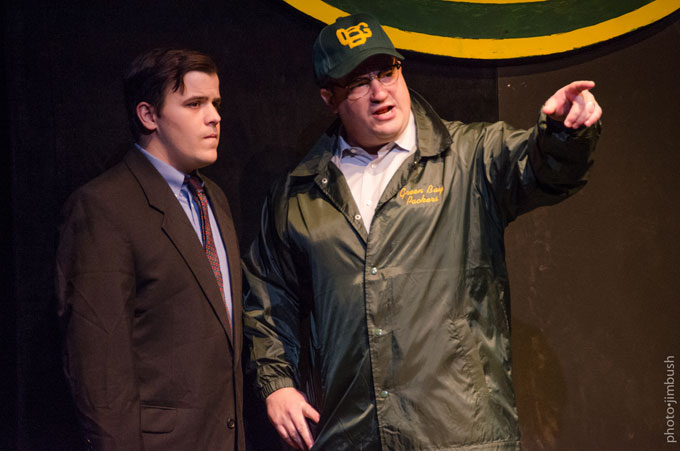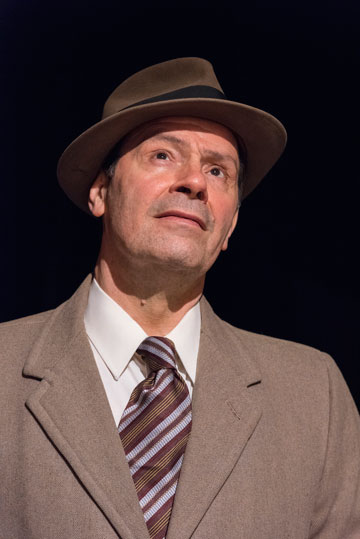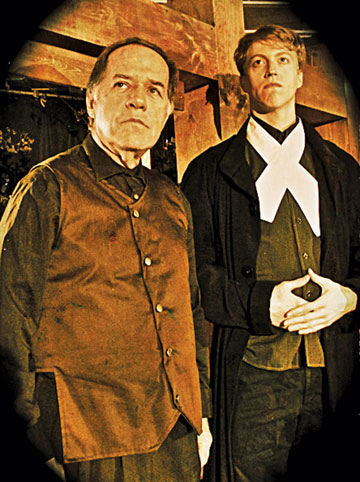A look at three local productions
by Anthony Chase

Theatrically Speaking
LOMBARDI
I know it’s being promoted as a football drama, but Lombardi, would more accurately be described as the story of a marriage. Yes, the play focuses on the personality of Vince Lombardi, the iconic head coach of the Green Bay Packers who lead his team to five national championships in seven years during the 1960s—including the first two Super Bowls—but my most vivid memories of the original 2010 Broadway production are of Judith Light’s remarkable performance as Mrs. Lombardi.
Marie Lombardi was a woman who made huge sacrifices so that the husband she adored could pursue the career that defined him. As Marie reveals in the play, “God, family, and the Green Bay Packers [were] the three most important things in his life, but not necessarily in that order.”
Eric Simonson’s play reveals the dynamics of a relationship in which the husband was such a perfectionist that one of his favorite maxims was “Show me a good loser, and I’ll show you a loser.” This attitude is reflected in his relationships with his players—each of whom he related to individually and differently in his efforts to get the best possible performance from them on the football field. Small gestures and statements from Marie Lombardi speak louder than all of her husband’s bombast and bluster: her nostalgia for Manhattan and the ability to find nice shoes there; simply stating that she is going to find an atlas in anticipation of a call from Green Bay, Wisconsin; and of course, her drinking.
Based on the best-selling biography When Pride Still Mattered: A Life of Vince Lombardi, by Pulitzer Prize-winning author David Maraniss, the framing device of the play is an interview from a fictitious writer for LOOK magazine, who comes to stay with the Lombardis for a week. In this production, Matt Witten plays Vince Lombardi, Steve Copps plays the journalist, and Susan Drozd plays Marie.
The show runs at 710 Main Theatre for eight performances November 13—23. Produced by MusicalFare Theatre and sponsored by the Buffalo Bills.

DEATH OF A SALESMAN
The excellent production of Arthur Miller’s Death of a Salesman now playing at the Irish Classical Theatre Company’s Andrews Theatre serves to remind us of the power and complexity of this American masterpiece. I think at each stage of our lives, we relate to the play differently, and as a consequence, each time we are reunited with a play that many first read in high school, it is a new and fresh experience.
Death of a Salesman tells the story of Willy Loman, a traveling women’s hosiery salesman now in his 60s. He no longer has the energy for the job and the retail has changed so completely that he has become a liability to the company where he has spent his entire career. To complicate matters, the two children he raised have grown up to be losers. It seems, at first, that Willy has passed on flawed values, but before the evening is over, we will learn that the source of the Loman family’s disillusion and disappointment runs much deeper and that the family dynamics are built on one lie after another.
John Fredo is marvelous as Willy, giving the character both dignity and desperation as he ranges back and forth from past to present. He is matched by the quiet authority of Ellen Horst as Linda, who lands her character’s famous speeches with a power that borders on the heroic. The idea that “attention must be paid,” to the gravity of an ordinary life has never been more eloquent or compelling.
Pascal Frisina III and Adam Rath give fine and tellingly contrasting performances as Biff and Happy. Frisina plays the older brother as a melding of defeat and self-deception. Rath plays the younger as a fresh-faced con artist who is his own worst victim.
The smaller roles that populate the world of this production are all satisfying. Joe Liolos shows a convincing arc of growth as Bernard, the nerdy neighbor boy who will grow up to be a great attorney. Bethany Sparacio forges a real and fully dimensioned woman in two small but commanding scenes as the woman in the hotel room whose affair with a salesman is revealed as a distraction from a life that is meaningless and lonely. Gerry Maher gives a sweet and ultimately affecting performance as the neighbor who looks after Willy, despite the fact that Willy is so difficult to like. As Willy’s brother Ben, a man who walked into the jungle as a young man and who came out rich, Mark Donahue walks the character into a magical reality and gives a memorable performance.
Doug Weyand plays Howard Wagner, Willy’s young and insensitive boss without making him seem either foolish or a like a monster. The situation is untenable and the world has changed, but this is not Howard’s fault. This choice makes the play’s conclusion more pointed than in many other productions I have seen.
Even the smallest of roles in this production are rendered vividly and with full dimension. Each performance falls in line to support the spine of this remarkable play. Stefan Brundage gets a great deal of mileage out of the role of Stanley, the waiter who shows Willy more kindness than his two sons. Jennifer Fitzery makes her single scene as Charley’s secretary both comical and profound and in just a few sentences, suggesting a familiarity and frustration with Willy Loman that seems to have been growing for years. I also enjoyed Hilary Walker as Miss Forsythe, Happy’s restaurant pick-up, and Kristin Bentley’s as Letta, the friend she recruits to meet Biff; together, Walker and Bentley walk in as real women with their own needs, their own motivation, their own dignity and aloneness.
Ultimately, of course, the excellence of the production is a credit to its director, Greg Natale, who has guided a unified and compelling version of this American classic. The set by Dyan Burlingame makes fine use of the Andrews circular stage. Marrie Hasselback-Costa’s costumes amplify the character and themes in very pleasing ways. Tom Makar’s sound design impressively fills the space with a wider environment and context.
The production continues through November 30th.

THE CRUCIBLE
It is a great time for fans of Arthur Miller in Buffalo. The production of his 1953 play, The Crucible, at American Repertory Theater of WNY features marvelous performances by Thomas LaChiusa and Lisa Vitrano as John and Elizabeth Proctor, a married couple in colonial Salem, Massachusetts, who get swept up in the hysteria of the witch trials of 1692.
Drew McCabe has directed the production of a play which, like Miller’s Death of a Salesman, takes the form of Modern Tragedy. He has populated the play with some superior talent. Steve Brachmann gives a wonderfully controlled performance as well-meaning Reverend John Hale. Virginia Brannon is convincing and appealing as falsely accused Goody Nurse. Danica Riddick imbues the conjuring slave, Tituba, with wry wisdom. Christopher Standart, who specializes in religious zealots, it would seem, having just completed a turn as a tormented minister in Tropical Heat at Alleyway, works his charm again—to far more menacing effect.
One of the main challenges of every production of The Crucible is to make the girls who whip themselves into a state of mass hysteria convincing. This production achieves mixed results. Sara Marioles Mitch plays spiteful and libidinous Abigail Williams with piercing single-mindedness, achieving something joyfully terrifying in the process.
The test of a good production of this play is its ability to make you squirm in your seat, even when you know the devastating conclusion. On this score, ART of WNY certainly succeeds. The production continues through November 22nd.
blog comments powered by Disqus
|
Issue Navigation> Issue Index > v13n46 (Week of Thursday, November 13) > A look at three local productions This Week's Issue • Artvoice Daily • Artvoice TV • Events Calendar • Classifieds |









 Current Issue
Current Issue